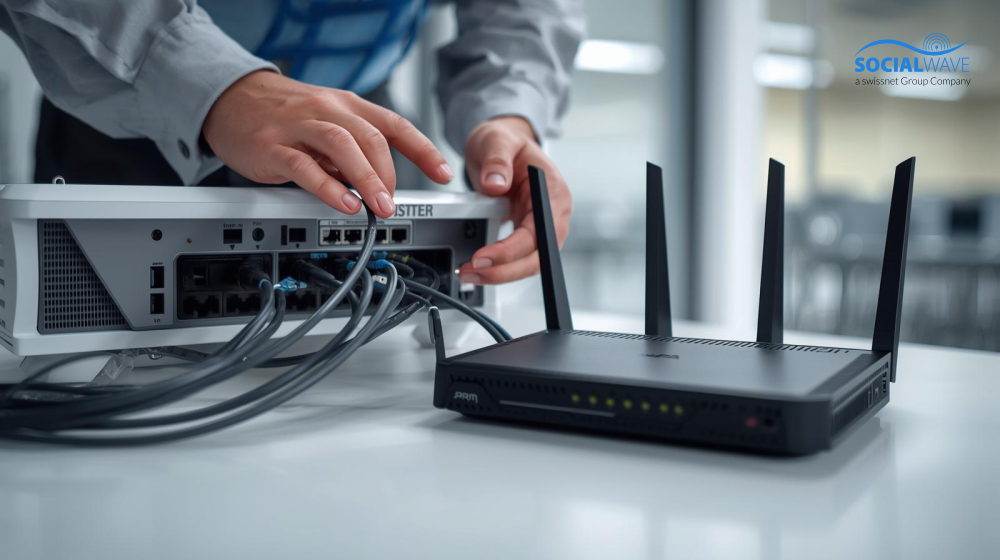GDPR-compliant guest WiFi — What SMEs need to consider

Why GDPR compliance is critical for guest WiFi
The provision of a guest WLAN may seem technically simple, but legally speaking, you are entering a complex field. As a WLAN operator, you become a service provider within the meaning of the Telemedia Act (TMG) and must at the same time meet the strict requirements of the GDPR.
The risks of non-compliance are significant:
- Warnings from competitors or consumer protection associations
- Fines from data protection authorities (up to 20 million euros or 4% of annual global turnover)
- Liability for legal violations by your guests (under certain circumstances)
- Reputational damage due to known data breaches
An overview of the legal basis for guest WiFi
Before we get to the specific measures, it is important to understand the relevant legal bases:
1st Telemedia Act (TMG)
The TMG regulates the basic obligations of service providers on the Internet. Section 13 TMG, which sets out information requirements, is particularly relevant.
2. General Data Protection Regulation (GDPR)
The GDPR sets comprehensive requirements for the processing of personal data. When operating a guest WLAN, the following data is typically collected:
- MAC addresses of the devices
- IP addresses
- connection data (time, duration)
- For login procedures: email addresses, names, and any other data
All this information is considered personal data and is therefore subject to the GDPR.
3. Liability for interference and provider privilege
The legal situation regarding liability for legal violations by WLAN users has improved significantly in recent years. The 3rd TMG Amendment Act has largely abolished liability for WLAN operators. However, there are risks under certain circumstances.
Mandatory measures for GDPR-compliant guest WiFi
1. Technical separation of guest and corporate networks
One of the most basic security measures is the strict separation between the internal company network and the guest WLAN. This prevents unauthorized access to sensitive corporate data and significantly reduces the risk of cyber attacks.
Practical implementation:
- Set up a separate VLAN for guests
- Using a firewall between networks
- Restriction of access rights in the guest network
2. Legally compliant user identification
The GDPR requires a legal basis for all data processing. When identifying WLAN users, there are usually two legal bases:
a) Consent (Article 6 (1) (a) GDPR)
Consent must be voluntary, informed, unambiguous and verifiable. In practice, this means:
- Transparent information about the type and scope of data processing
- Active consent (e.g. by clicking on a checkbox)
- No link to other services
- Possibility to cancel at any time
b) Legitimate interest (Article 6 (1) (f) GDPR)
Alternatively, data processing can be based on a legitimate interest if:
- There is a legitimate interest of the company (e.g. IT security)
- Processing is necessary to protect this interest
- The interests of those affected do not prevail
3. Data protection-compliant captive portal solution
A captive portal is a website that appears when you first connect to the WLAN and controls access. For GDPR compliance, the portal should:
- Include an understandable privacy policy
- Clearly state the terms of use
- Obtain active consent to data processing
- Query only the most necessary data (data economy)
- Ensuring secure transmission (HTTPS)
4. Minimize data collection
According to the principle of data economy, you should only collect the data that is absolutely necessary to operate the WLAN:
- If possible, refrain from entering names or email addresses
- Save MAC and IP addresses only when necessary
- Anonymize or pseudonymize data wherever possible
5. Define an appropriate storage period
Personal data may only be stored for as long as is necessary for the purpose:
- Connection data for IT security purposes: maximum 7 days
- Data for billing purposes: until the legal retention periods expire
- Regular automatic deletion after the deadlines have expired
6. Documentation and processing directory
As the person responsible for data processing, you must document this:
- Inclusion of the guest WLAN in the register of processing activities (Art. 30 GDPR)
- Documentation of technical and organizational measures
- Regular review and update
7. Implement security measures
The GDPR requires appropriate technical and organizational measures to protect personal data:
- WiFi network encryption (at least WPA2)
- Regularly update the router's firmware
- Implement access controls
- Monitoring network traffic for suspicious activity
Checklist: Is your guest WiFi GDPR-compliant?
□ Technical separation from the corporate network achieved
□ Legally compliant user identification implemented
□ Privacy-compliant captive portal solution set up
□ Minimize data collection to what is necessary
□ Appropriate storage period defined and technically implemented
□ Guest WiFi documented in the processing directory
□ Current security measures implemented
□ Privacy policy created for guest WiFi
□ Terms of use formulated and made available
□ Process for information and deletion requests established
Common mistakes when operating a guest WLAN
1. Missing or faulty privacy policy
Many SMEs fail to provide a specific privacy policy for their guest WiFi or use incomplete templates. However, the privacy policy must contain all information in accordance with Art. 13 GDPR and specifically address data processing in WLAN.
2. Inadequate consent collection
A common source of error is the lack of consent. Default checkmarks, hidden clauses or lack of withdrawal options make consent ineffective.
3. Excessive data collection
By default, many WLAN solutions collect more data than necessary. Critically check which data is actually required for your purpose and disable unnecessary collection features.
4. Neglecting IT security
An insecure WiFi not only endangers your guests' data, but can also become a gateway for attacks on your company. Regular security updates and strong encryption are essential.
Professional solutions for legally secure guest WiFi
In view of the complex legal requirements, many SMEs opt for specialized complete solutions. These offer several benefits:
- Legal security through preconfigured, GDPR-compliant settings
- Professional captive portals with customizable privacy statements
- Automated deletion routines for personal data
- Regular updates to adapt to new legal requirements
- Marketing features such as social media login or customer loyalty programs
Socialwave, for example, offers such a professional solution. The provider specializes in GDPR-compliant guest WiFi solutions and offers tailor-made packages for various industries and company sizes.
Conclusion: Legal certainty with guest WiFi is feasible
Operating a GDPR-compliant guest WLAN may seem complex at first glance, but it is certainly feasible with the right approach. Investing in a legally secure solution not only protects against costly warnings and fines, but also creates trust with your customers and business partners.
Especially for SMEs that do not have their own IT and legal departments, a specialized complete solution such as that from Socialwave can significantly reduce costs and at the same time offer maximum legal security.
Recommended action
Check your existing guest WiFi using our checklist or get advice from experts when setting up a new one. With Socialwave, you get a tailor-made, GDPR-compliant solution that not only offers you legal security, but also opens up valuable marketing opportunities.
Find out now about SocialWave's GDPR-compliant guest WiFi solutions and arrange a free consultation.








.svg)

.svg)
.svg)



